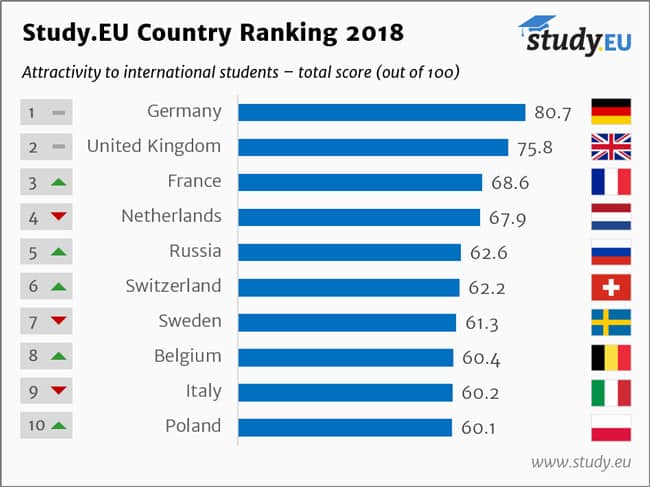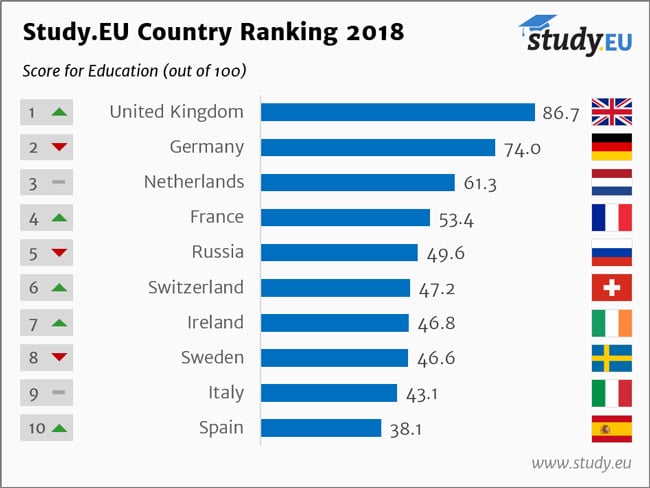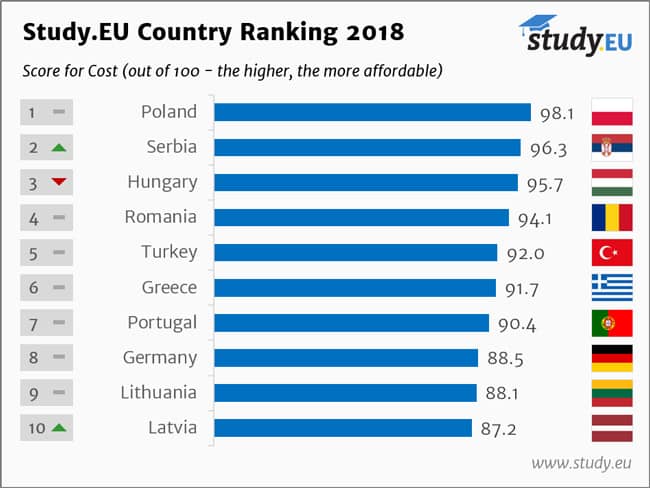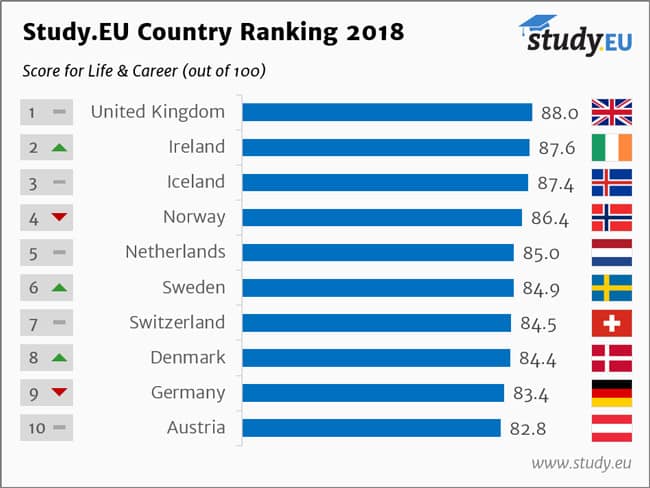Germany ranked as most attractive study destination in Europe
- An annual ranking of European study destinations places Germany at the top of the table as the most attractive option for international students
- The ranking measures a range of education, cost, career, and quality of life factors to score 30 European destinations
- However, most of the destinations included in the analysis factor in the top-ten tables for one or more of the major ranking factors
An annual analysis ranks Germany as the best choice for international students within a table of 30 European study destinations. This marks the second consecutive year in which Germany appears at the top of the Study.Edu Country Ranking, a performance the higher ed portal attributes to the country’s “remarkable mix of world-class education at no or almost no fees.” In addition, Study.EU points out that Germany has made “a considerable improvement in the number of courses offered in English" and boasts the lowest unemployment rate for university graduates in Europe.
Ranking in three dimensions
Study.EU says that the key question addressed by its ranking is “Which European countries are the best choices for full-time degree students?”
Data informing the ranking include university world rankings, governmental and university information on study programmes and tuition fees, and data from sources including Eurostat, the UN, and the OECD regarding cost of living, unemployment, quality of life, and safety in the various countries.
The ranking is based on scores in three areas: Education, Cost, and Life & Career. For the first time, this year’s analysis incorporates a score for “personal safety” in the Life & Career area, reflecting the importance of this consideration for today’s international students. Of the three dimensions, Education (i.e., quality of education) is weighted the highest, making up 45% of the total score, with Cost accounting for 30% and Life & Career scores contributing the final 25%. These three key factors are used to generate an overall score for each country out of 100.
As the following table reflects, other European destinations ranked among the top 10 are, from second to tenth, the UK, France, Netherlands, Russia, Switzerland, Sweden, Belgium, Italy, and Poland. The 2018 ranking marks two firsts: the first time for Russia making it into the top 5 and the first time for Poland to be counted among the top 10.

Leaders differ by ranking factor
Looking just at Education factors, the UK is ranked first by a wide margin with a score of 86.7% versus the next highest scores of Germany (74%), Netherlands (61.3%), and France (53.4%). This dimension is scored according to performance in university rankings, indicators of teaching quality, and number of English-taught bachelor’s and master’s programmes.
When it comes specifically to teaching quality, as measured by staff-to-student ratios and academic reputation surveys, Switzerland, the Netherlands, and Germany score the highest.



World events influencing student mobility
Speaking with Forbes magazine, Gerrit Blöss, CEO of Study.EU, highlighted two factors he sees influencing “the direction of international higher education for years to come”:
“First, there is the Trump presidency driving international students away from the US to other countries – in many cases, Europe. And then there is the upcoming Brexit, of which neither the timeline nor the consequences are foreseeable.”
There are indications that European universities outside of the UK are increasing the number of courses taught in English in preparation for Brexit, with Study.EU estimating that “the total number of English-taught programmes in universities on the continent has risen by 13% in the last year.”
Poland on the move
In 2015, Poland announced a target to host 100,000 international students by 2020, and it is steadily working on improving its offer to foreign students. Study.EU points out that affordability and English-taught programmes are key considerations for international students, and singles out Poland as worthy of mention in both respects:
“Already among last year’s most affordable countries, Polish universities have consistently increased the availability of English-taught study options. No wonder, then, that the number of foreign students in Poland has exploded from just 12,000 to over 65,000 in the past ten years.”
At the end of the day, the overall impression one has from the ranking is of a balanced field across Europe. Study.EU highlights that despite Germany’s overall leadership position, many other European destinations offer distinct advantages for international students. "Each country has its strengths and its weaknesses,” notes the report. “There are no nations that are consistently among the best, or among the worst, for every single input factor. When looking at the three individual areas, more than two-thirds of all ranked countries make it into at least one of the top 10 lists.” For additional background, please see:


















